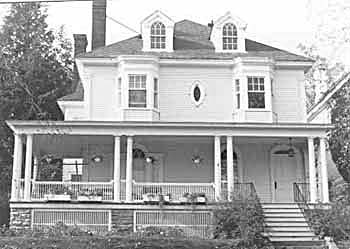Bragdon, Claude (1866-1946)
An architect of renown, Claude Bragdon worked for the most part in and around Rochester, NY, and in his autobiography mentions with some satisfaction a few of his achievements, such as Rochester Central Station, Rochester's First Universalist Church, and a little Italian Presbyterian Church. He was also the architect for Peterborough Bridge, Ontario, Canada. Salisbury House below in Oswego's Franklin Square was designed in the Classic Revival Style.
|
Claude Bragdon's other interests ranged over an unusually wide field of interests and endeavour, from the theatre to Theosophy. He also felt the urge to write and to publish. It was under his imprint, The Manas Press, that Confessions of Two Brothers, by John Cowper and Llewelyn Powys, was published. In his autobiography, he remembers:
I got to know John Cowper Powys when he came to Rochester to lecture. He both loved and hated lecturing. I asked him once why he continued to give lectures, and he answered that it enabled him to rid himself of certain hates and loathings which, undischarged, would poison him, mentally and physically. He lectured to please himself more than to please his audiences, but people flocked to witness his fireworks, even when they got singed by them. For he liked to jog them out of their complacencies — to make them squirm — even while he awakened in them new perceptions. Sometimes while pacing up and down the platform, clad in his flowing Oxford robe, or grasping the back of a chair with his long, nervous fingers, intent upon the precise formulation of some envenomed thought, he seemed like a big black spider spinning a web of words with which to ensnare the minds of the unwary; while at other times and in other moods he was a black-robed priest, his lips as though touched by a coal from the altar, communication the eternal truth of things.
Powys tells in his autobiography of the effect on him of my presence in the audience, which was to provoke him to the utterance of his most outrageous heterodoxies. His hearers being almost exclusively women, their puritanical inhibitions became the object of his attack — but by indirection, like: 'Ladies, you know we all like to have our sexual life go on pleasantly...' He so shocked the Women's Educational and Industrial Union on one occasion that they vowed never to have him speak to them again — but they did have him. (The Secret Springs, 1938)
|
